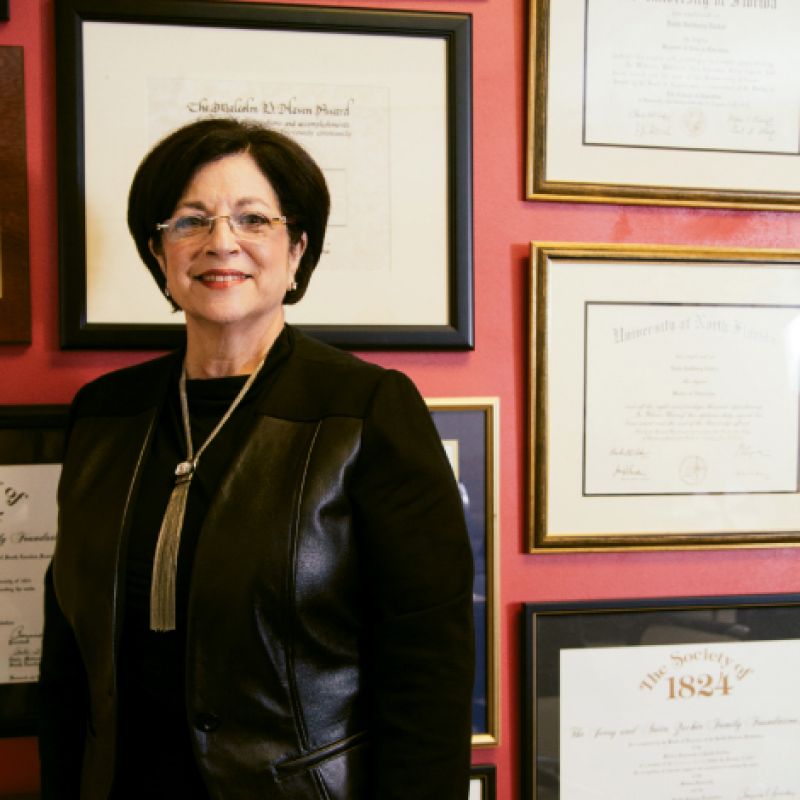
The goals are daunting, outlandish even: Every child will be prepared for school. Every child will be supported in and out of school. Every child will graduate from high school prepared for post-secondary education and/or employment. Every student enrolled in post-secondary education will complete successfully and will enter a career.
“Every” is a monumental word, especially in light of monumental challenges, when currently 12 percent of CCSD incoming high-school freshmen read at the fourth-grade level. When more than 2,000 of the Tri-county’s 16 to 18 year olds are not enrolled in school or are not high school graduates. It takes either a wild, wishful dreamer or a bold, dauntless powerhouse to set such goals. Or maybe both. Meet Anita Zucker.
Of course, you probably don’t need an introduction. It’s hard to keep a low profile when you’re South Carolina’s only billionaire. When you are the state’s leading philanthropist with your last name attached to umpteen boards, causes, and buildings. As chairman and CEO of the InterTech Group, founded by her late husband, Jerry, and ranked No. 110 on the Forbes list of America’s largest private companies, Zucker has been a game changer for a long while simply by being in the game, and funding it, on so many fronts. But now she’s ramping up to take the game to a whole new level.
Zucker’s latest endeavor is birthing the Tri-county Cradle to Career Collaboration—the group with the audacious goals previously mentioned. Imagine the Charleston Stingrays (which she owns) suddenly finding themselves in the rink at the Stanley Cup, and Zucker’s got the stick.
Tri-county Cradle to Career Collaborative (TCCC) is at heart an education endeavor, but frankly, it’s easier to describe what it isn’t. It is not a new program or initiative, per se, nor is it a newfangled teaching methodology or curriculum overhaul or standards framework. Instead, it’s basically huddling the team. Orchestrating a widespread effort, across all sectors of the community (business, health, social services, education, nonprofit) to align, support, and facilitate disciplined community-wide collaboration, informed and driven by metrics and continuous data feedback throughout the cradle-to-career continuum to improve educational outcomes. All of which boils down to “collective impact”—i.e. breaking through the multiple silos where many excellent programs, well-intentioned volunteers, and experts are already working and aligning them in order to compound these efforts and investments.
The TCCC grew out of the Charleston Regional Development Alliance’s 2011 “Opportunity Next” study (Zucker served on the steering committee) that identified challenges in workforce readiness and talent attraction and retention as primary obstacles to the metro region’s future growth. TCCC is modeled after the STRIVE initiative piloted in Cincinnati, Ohio, where after seven years of applying a collective impact strategy, kindergarten readiness has improved from 12 to 72 percent in one school district.
The key to creating a collective impact model is a dynamic convener, a person who can bring all the various people and pieces to the table. “I guess I became that person,” says the ever-humble Zucker, who chairs TCCC’s board. “The good news is that the people came.” The all-star board, appointed only a year ago this month, includes leaders of the region’s largest nonprofits, corporations, tech companies, and universities, and to date they have raised $1.1 million out of the $1.5 million start-up price tag. They conducted a national search for a CEO, who’s expected to be in place by publication time.
So how will TCCC be different from all the other education reforms, efforts, programs, acronym acrobatics that, for the most part, have only resulted in mediocre gains, if that? How will TCCC accomplish its undeniably lofty goals?
Zucker gives a cheerful laugh, then a sigh, “I don’t really know,” she admits. Then she narrows those dark brown eyes that looked out on the classrooms of children she taught for 12 years before entering the business world. “Here’s the thing. We just can’t drop kids. If I’m a manufacturer, and I’m producing a product for Boeing, I can’t produce it at 80 percent and say it’s okay. God forbid I should make a plane crash. So why should we allow a child to crash? We can’t complete a child’s education and say it’s good enough, you’re 80 percent there.”
When she talks about “leveraging everything we’ve got, every person, every parent, every business,” Zucker speaks not as an idealist, but as an adamant optimist and hard-driving businesswoman whose multi-billion dollar company relies on a trained workforce. “We can’t be the Charleston of tomorrow if we don’t bring the future with us,” she says, “and the future’s already here.”